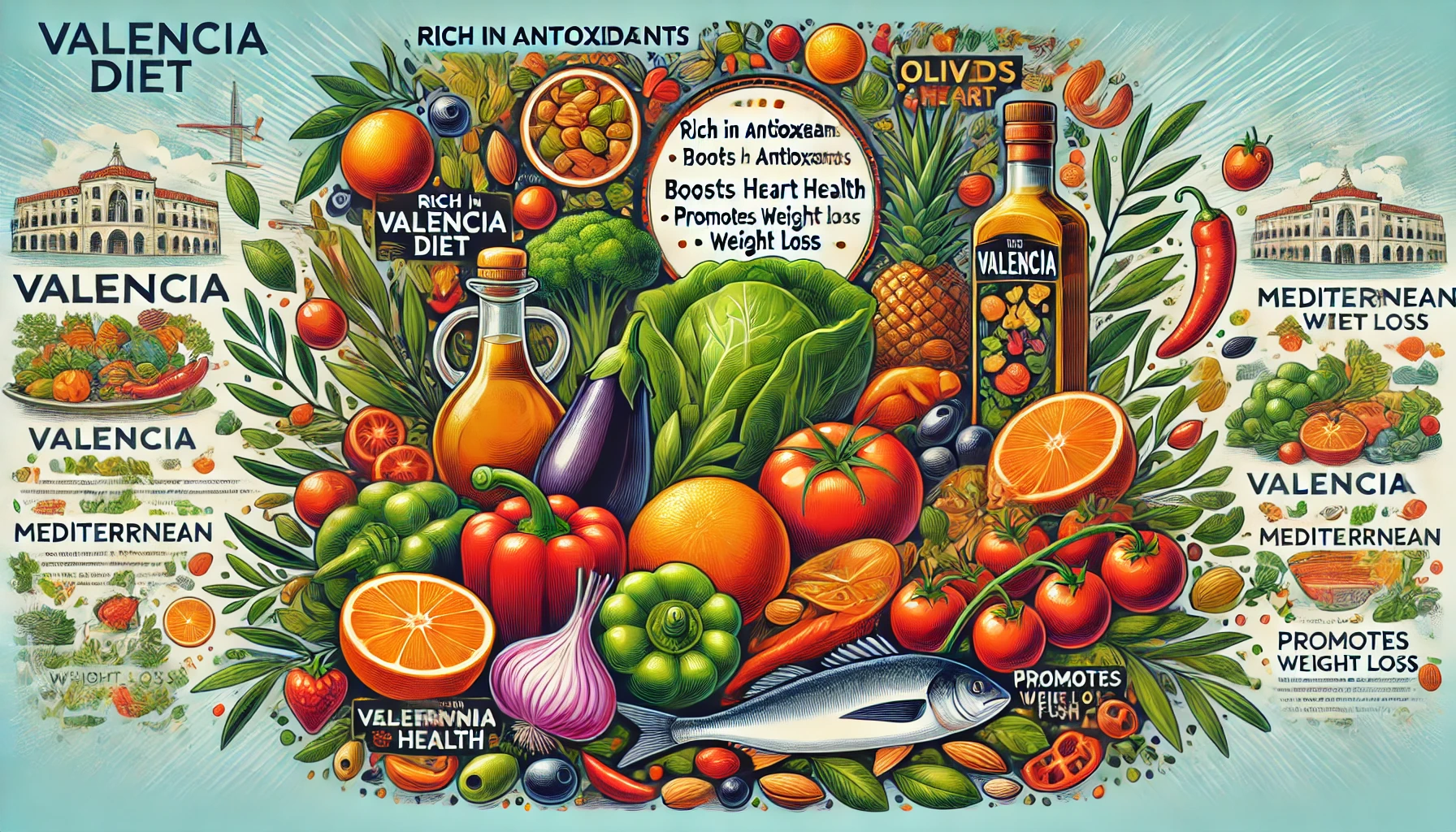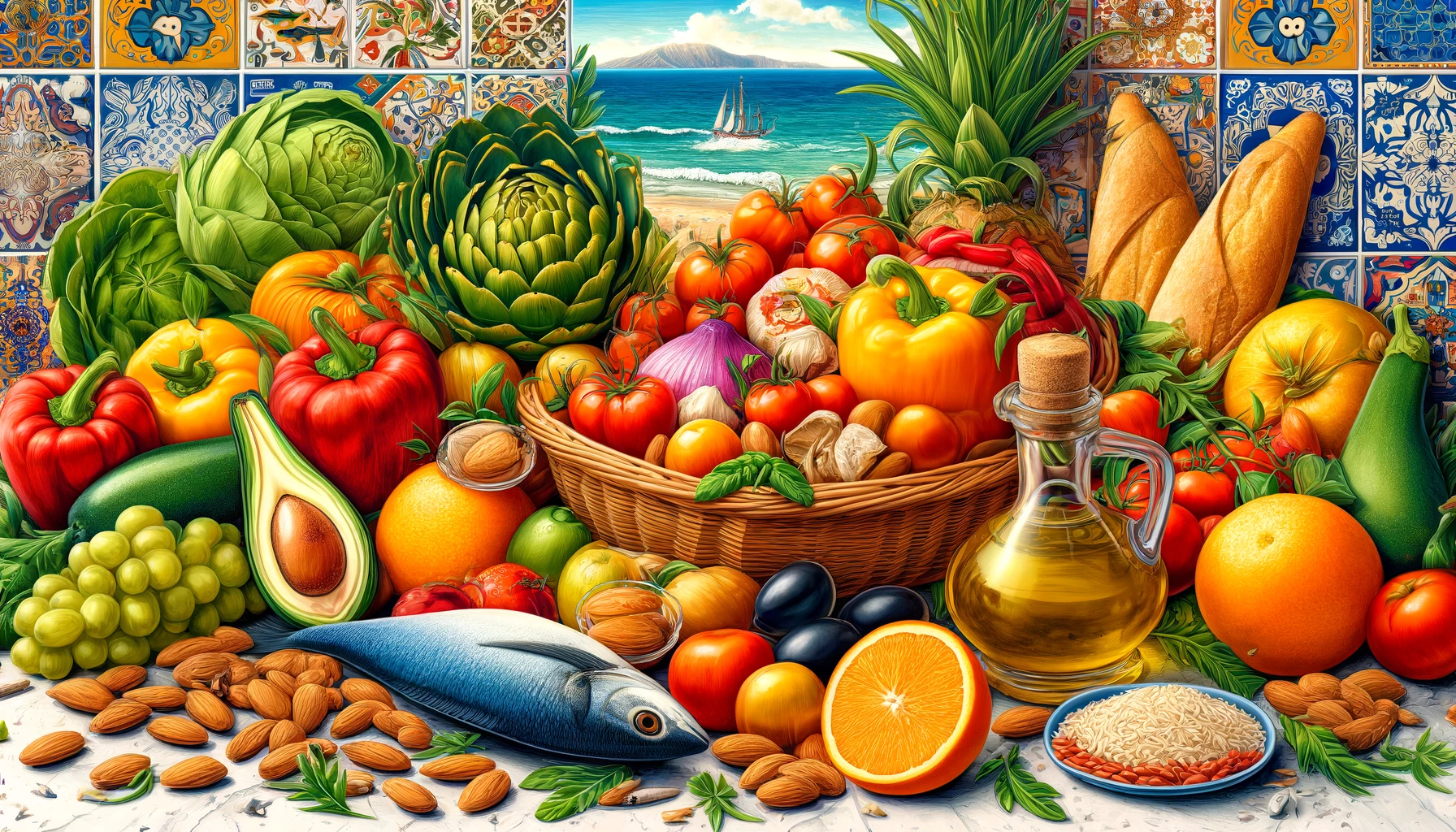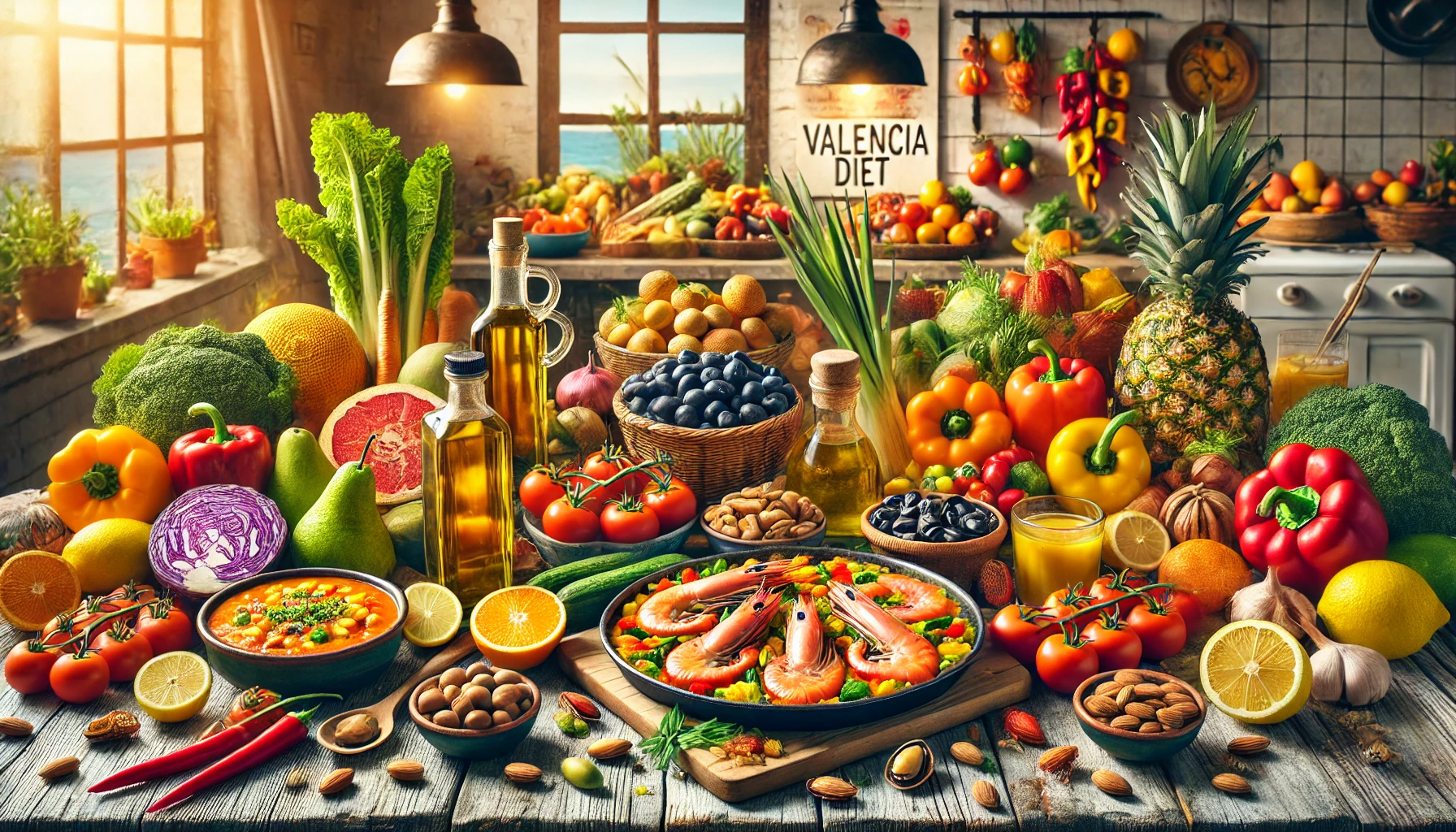Valencia Diet
What is the Valencia Diet?
The Valencia Diet is a nutritional approach inspired by the traditional dietary habits of the Valencia region in Spain. Rooted in the Mediterranean diet, the Valencia Diet emphasizes fresh, local, and seasonal foods, focusing on whole foods, lean proteins, healthy fats, and a variety of fruits and vegetables. This diet is not only about food consumption but also incorporates the cultural and social aspects of eating, such as enjoying meals with family and friends and maintaining a balanced lifestyle. The Valencia Diet aims to promote overall health and well-being through nutrient-dense foods and mindful eating practices.
Ingredients of the Valencia Diet
The Valencia Diet, inspired by Mediterranean eating habits, focuses on fresh, local, and seasonal foods. Here is a detailed list of ingredients that are central to this diet:
Fresh Fruits and Vegetables
Fruits:
- Oranges
- Apples
- Berries (strawberries, blueberries, raspberries)
- Grapes
- Figs
- Pomegranates
- Lemons
- Apricots
- Peaches
- Pears
Vegetables:
- Tomatoes
- Bell peppers
- Zucchini
- Eggplant
- Leafy greens (spinach, kale, arugula)
- Onions
- Garlic
- Artichokes
- Carrots
- Cucumbers
- Broccoli
- Cauliflower
- Green beans
- Mushrooms
- Asparagus
Historical Background and Cultural Significance
Valencia, located on the eastern coast of Spain, boasts a rich culinary history that reflects its diverse cultural influences and abundant natural resources. The region’s cuisine has been shaped by various civilizations, including the Romans, Moors, and Christians, each leaving a lasting impact on the local food traditions. The fertile land and favorable climate of Valencia have made it a prime area for agriculture, producing a wide range of fruits, vegetables, grains, and seafood.
The traditional Valencian diet, which forms the basis of the Valencia Diet, is deeply rooted in the Mediterranean way of life. This dietary pattern has been associated with numerous health benefits, including improved cardiovascular health, reduced inflammation, and better weight management. The cultural significance of the Valencia Diet extends beyond its nutritional value; it embodies a way of living that values community, sustainability, and a harmonious relationship with nature.

What to Eat on the Valencia Diet
The Valencia Diet is a variation of the Mediterranean diet, emphasizing fresh, local, and seasonal foods. It incorporates a wide variety of fruits, vegetables, whole grains, lean proteins, healthy fats, and herbs and spices. Here’s a detailed guide on what to eat on the Valencia Diet:
Fresh Fruits and Vegetables
Fruits:
- Oranges and other citrus fruits
- Apples
- Berries (strawberries, blueberries, raspberries)
- Grapes
- Figs
- Pomegranates
Health Benefits of the Valencia Diet

Cardiovascular Health
The Valencia Diet, like other Mediterranean diets, is known for its heart-protective properties. This diet emphasizes the consumption of healthy fats, lean proteins, and a variety of fruits and vegetables, which collectively contribute to cardiovascular health. Here’s how the Valencia Diet benefits the heart:
- Healthy Fats: Olive oil, a staple in the Valencia Diet, is rich in monounsaturated fats that help reduce bad cholesterol levels and lower the risk of heart disease. Nuts and seeds also provide beneficial fats and omega-3 fatty acids, which support heart health.
- Lean Proteins: Fish, particularly fatty fish like salmon and sardines, are high in omega-3 fatty acids, known to reduce inflammation and lower the risk of heart disease.
- Fiber-Rich Foods: Whole grains, legumes, fruits, and vegetables are high in fibre, which helps to manage cholesterol levels and maintain a healthy heart.
Weight Management
The Valencia Diet promotes a balanced intake of nutrient-dense foods, which supports healthy weight management. Key aspects include:
- Whole Foods: Emphasizing whole, unprocessed foods helps to naturally control calorie intake while providing essential nutrients.
- Satiety: High-fiber foods like vegetables, fruits, whole grains, and legumes promote a feeling of fullness, which helps to prevent overeating.
- Balanced Meals: The inclusion of healthy fats, lean proteins, and complex carbohydrates in every meal ensures a balanced energy supply and helps regulate blood sugar levels, reducing cravings.
How to Start the Valencia Diet

Essential Pantry Staples
To begin the Valencia Diet, stock your pantry with these essential staples:
- Olive Oil: Use as the primary cooking oil and for dressings.
- Entire Grains: Earthy colored rice, quinoa, entire wheat bread, and oats.
- Legumes: Chickpeas, lentils, and beans.
- Nuts and Seeds: Almonds, pecans, sunflower seeds, and chia seeds.
- Fresh Fruits and Vegetables: Seasonal produce like tomatoes, peppers, leafy greens, berries, and citrus fruits.
- Lean Proteins: Fish, chicken, and plant-based proteins like tofu.
- Herbs and Spices: Fresh and dried herbs such as basil, parsley, oregano, and rosemary.
Weekly Meal Planning Tips
Effective meal planning helps to ensure you stick to the Valencia Diet. Here are some tips:
- Plan Your Meals: Outline meals for the week, focusing on seasonal and local produce.
- Prep in Advance: Prepare ingredients in bulk, such as chopping vegetables, cooking grains, and making dressings.
- Batch Cooking: Cook large batches of meals like soups, stews, and casseroles that can be easily reheated.
- Balanced Plates: Ensure each meal includes a balance of proteins, healthy fats, and carbohydrates.
Shopping List for Beginners
Here’s a sample shopping list to get you started on the Valencia Diet:
Fruits and Vegetables:
- Tomatoes
- Bell peppers
- Spinach
- Leafy greens
- Oranges
- Apples
- Berries

Valencia Diet: Meal Plan
Breakfast Options
Mediterranean Avocado Toast
- Ingredients: Whole grain toast, ripe avocado, cherry tomatoes, olive oil, sea salt, black pepper.
- Preparation: Mash the avocado and spread it over the toasted bread. Top with halved cherry tomatoes, a drizzle of olive oil, and a sprinkle of sea salt and black pepper.
Yogurt with Fresh Fruit and Nuts
- Ingredients: Greek yogurt, seasonal fruits (berries, oranges), almonds or walnuts.
- Preparation: Serve Greek yogurt in a bowl. Add a mix of fresh, seasonal fruits and a handful of nuts for a crunchy texture.
Vegetable Omelette
- Ingredients: Eggs, spinach, bell peppers, onions, feta cheese, olive oil.
- Preparation: Whisk the eggs and pour into a hot, oiled skillet. Add chopped spinach, bell peppers, and onions. Cook until the eggs are set, then sprinkle with feta cheese before folding the omelet.
Oatmeal with Honey and Nuts
- Ingredients: Rolled oats, milk or water, honey, walnuts or almonds, fresh fruit (optional).
- Preparation: Cook the oats in milk or water according to package instructions. Sweeten with honey and top with nuts and optional fresh fruit for added flavor and nutrition.
Lunch Ideas
Valencian Salad
- Ingredients: Mixed greens, olives, tomatoes, cucumbers, red onions, grilled chicken, olive oil, and balsamic vinegar.
- Preparation: Combine mixed greens, olives, sliced tomatoes, cucumbers, and red onions in a bowl. Top with grilled chicken slices. Dress with olive oil and balsamic vinegar.
Quinoa and Chickpea Bowl
- Ingredients: Quinoa, chickpeas, roasted vegetables (zucchini, eggplant, bell peppers), lemon-tahini dressing.
- Preparation: Cook the quinoa and mix with chickpeas and roasted vegetables. Drizzle with lemon-tahini dressing and toss to combine.
Seafood Paella
- Ingredients: Brown rice, shrimp, mussels, peas, saffron, garlic, olive oil.
- Preparation: Cook the brown rice with saffron and garlic. Add the shrimp and mussels, and cook until the seafood is done. Stir in peas before serving.
Grilled Vegetable Wrap
- Ingredients: Whole grain wrap, grilled zucchini, bell peppers, onions, hummus, fresh spinach.
- Preparation: Spread hummus on the whole-grain wrap. Add grilled vegetables and fresh spinach, then roll up the wrap.
Dinner Recipes
Grilled Fish with Vegetables
- Ingredients: Fish fillets (such as cod or salmon), olive oil, lemon, herbs (thyme, rosemary), assorted vegetables (carrots, zucchini, bell peppers).
- Preparation: Marinate fish fillets in olive oil, lemon juice, and herbs. Grill until cooked through. Serve with a side of roasted vegetables.
Stuffed Peppers
- Ingredients: Bell peppers, brown rice, lean ground turkey, tomatoes, onions, garlic, spices (cumin, paprika).
- Preparation: Cook the brown rice and mix it with ground turkey, diced tomatoes, onions, garlic, and spices. Stuff the blend into split chime peppers and prepare until the peppers are delicate.
Lentil Stew
- Ingredients: Lentils, carrots, celery, tomatoes, onions, garlic, spices (cumin, coriander), olive oil.
- Preparation: Sauté onions and garlic in olive oil. Add chopped carrots, celery, and spices, and cook until tender. Add lentils and tomatoes, and simmer until lentils are cooked through.
Baked Chicken with Herbs
- Ingredients: Chicken breasts, olive oil, mixed herbs (thyme, rosemary, oregano), garlic, lemon.
- Preparation: Rub chicken breasts with olive oil, herbs, minced garlic, and lemon juice. Prepare till the chook is cooked through and brilliant brown.
Foods to Include in the Valencia Diet

Fruits and Vegetables
Fruits and vegetables are the cornerstone of the Valencia Diet. Aim to include a variety of colorful, seasonal produce in your meals to ensure a diverse intake of vitamins, minerals, and antioxidants. Some popular choices in the Valencia region include tomatoes, peppers, oranges, and artichokes.
Whole Grains
Whole grains such as barley, quinoa, and whole wheat bread are important sources of complex carbohydrates and fiber. These grains help to maintain steady energy levels and support digestive health. Traditional Valencia dishes often incorporate whole grains in the form of bread, rice, and pasta.
Legumes and Nuts
Legumes, including beans, lentils, and chickpeas, provide plant-based protein, fiber, and essential nutrients. Nuts and seeds, such as almonds, walnuts, and sunflower seeds, are excellent sources of healthy fats and protein. These foods are staples in the Valencia Diet and can be included in salads, soups, and snacks.
Olive Oil
Olive oil is the primary source of fat in the Valencia Diet and is used for cooking, dressings, and dips. Rich in monounsaturated fats and antioxidants, olive oil supports heart health and adds a delicious flavor to meals. Choose extra virgin olive oil for the highest quality and nutritional benefits.
Seafood
Seafood, particularly fish, is a major component of the Valencia Diet. It provides high-quality protein, omega-3 fatty acids, and essential nutrients such as iodine and selenium. Aim to include a variety of fish, such as sardines, mackerel, and salmon, in your diet to benefit from their nutritional properties.
Conclusion
The Valencia Diet offers a delicious and nutritious approach to eating that is rooted in the traditional culinary practices of the Valencia region in Spain. By emphasizing fresh, locally sourced foods, healthy fats, and a balanced intake of macronutrients, the Valencia Diet supports overall health and well-being. Whether you are looking to improve your heart health, manage your weight, or reduce your risk of chronic diseases, the Valencia Diet provides a sustainable and enjoyable way to achieve your health goals.
FAQs About Valencia Diet
Q1. What foods are included in the Valencia Diet?
A: The Valencia Diet includes a variety of fresh fruits and vegetables, whole grains, nuts, legumes, olive oil, fresh seafood, lean meats, and dairy products. It additionally energizes moderate admission of red wine.
Q2. Is the Valencia Diet suitable for vegetarians?
A: Yes, the Valencia Diet can be easily adapted for vegetarians. The diet’s emphasis on plant-based foods such as fruits, vegetables, legumes, and nuts makes it a great option for vegetarians.
Q3. How can I start the Valencia Diet?
A: Begin by incorporating more fresh, seasonal produce into your meals and reducing the consumption of processed foods. Gradually introduce traditional Valencian dishes and focus on mindful eating practices.
Q4. What role does physical activity play in the Valencia Diet?
A: Physical activity is an integral part of the Valencia Diet. Regular exercise complements the healthy eating patterns of the diet, promoting overall wellness, weight management, and cardiovascular health.
Q5. How does the Valencia Diet impact heart health?
A: The diet’s emphasis on olive oil, fish, nuts, and fresh produce helps reduce bad cholesterol levels and improve overall heart health, significantly lowering the risk of cardiovascular diseases.

4 thoughts on “Valencia Diet Top 5 Foods to Include in Your Plan”